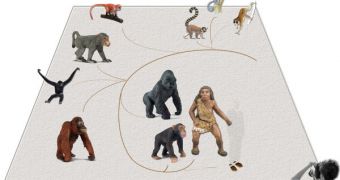Evolution in a biological context roughly translates into a species' ability to favor the passing on of genes that ensure its survival into the next generation. In order for this to happen, mutations must occur. Mutations generate diversity, but can also have adverse effects on a species, and lead to its extinction. In a groundbreaking, new study, experts discovered that, once a protein, for instance, evolved into a higher form than its original one, it could no longer devolve, or go back to its previous state. The experts behind the investigation say that there is no easy way of going back, LiveScience reports.
As various species of humans evolved from the common ancestors we share with primates, it was mutations and adaptations that set our ancestors on a path to becoming the dominant species on the planet. If evolutionary regression had been possible, then at least some humans would have surely devolved back into forms similar to the common ancestor, once the environmental factors that drove their mutations in the first place disappeared. However, historical records and fossil discoveries show that this type of events never took place.
“Evolutionary biologists have long been fascinated by whether evolution can go backwards. But the issue has remained unresolved, because we seldom know exactly what features our ancestors had, or the mechanisms by which they evolved into their modern forms,” expert Joe Thornton, who has been a researcher in the new paper, explains. He holds a joint appointment at the University of Oregon (UO) Center for Ecology and Evolutionary Biology, and at the Howard Hughes Medical Institute. In a study published in the September 24 issue of the journal Nature, he and his team detail the genetic “blockades” that prevent devolution.
The team also demonstrates that, even if prehistoric, environmental pressure were to descent on us again, our proteins, which have come a long way over millions of years, would not be able to revert to the original forms that they had when the homo species first started evolving from primates. “This is the best demonstration of the molecular foundations of evolutionary irreversibility that I have ever read,” University of California in Irvine (UCI) Professor of Ecology and Evolutionary Biology Michael Rose says of the study.
“What this new Nature publication shows is that on a much longer time-scale (more than a million generations), it is harder to get evolution to reverse itself. This is how evolutionists explain things like the failure to reverse-evolve gills in whales or dolphins. Too many generations have elapsed since the ancestors of the Cetaceans had functional gills as adults,” he adds. Rose has not been involved in the new research effort.

 14 DAY TRIAL //
14 DAY TRIAL //